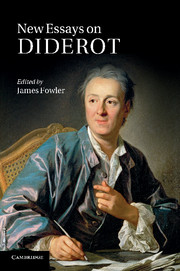Book contents
- Frontmatter
- Contents
- Notes on contributors
- Acknowledgements
- List of abbreviations
- Introduction
- PART I DIDEROT THE PHILOSOPHE
- PART II NOVELS
- PART III DIALOGUES
- 10 Eyes wide shut: Le Rêve de d'Alembert
- 11 Logics of the human in the Supplément au Voyage de Bougainville
- PART IV PLAYS AND DRAMATIC THEORY
- PART V MUSIC, PERFORMANCE, AESTHETICS
- Select bibliography
- Index
10 - Eyes wide shut: Le Rêve de d'Alembert
Published online by Cambridge University Press: 11 April 2011
- Frontmatter
- Contents
- Notes on contributors
- Acknowledgements
- List of abbreviations
- Introduction
- PART I DIDEROT THE PHILOSOPHE
- PART II NOVELS
- PART III DIALOGUES
- 10 Eyes wide shut: Le Rêve de d'Alembert
- 11 Logics of the human in the Supplément au Voyage de Bougainville
- PART IV PLAYS AND DRAMATIC THEORY
- PART V MUSIC, PERFORMANCE, AESTHETICS
- Select bibliography
- Index
Summary
Le Rêve de d'Alembert (D'Alembert's Dream) is an exhilarating read. It offers us a triptych of lively conversations, involving characters, three male and one female, one asleep and three awake, and topics that range from dualism, materialism and scepticism, to sensibility, selfhood and memory, to the origins of the universe and the workings of nature, from Siamese twins to a priest who underwent a gall bladder operation without feeling any pain, from masturbation to sex with goats. There is something for everyone here. The language and the form of the text are no less wide-ranging, combining philosophical and scientific language in a comic and theatrical dialogue, complete with stage directions. The first part, entitled ‘La Suite d'un entretien entre M. d'Alembert et M. Diderot’ (‘Continuation of the Conversation between Diderot and D'Alembert’), is a fairly typical philosophical dialogue involving a philosophe by the name of Diderot and his friend, the mathematician, d'Alembert. The second, ‘Le Rêve de d'Alembert’ (‘D'Alembert's Dream’), set in d'Alembert's bedroom, is, by contrast, formally much more complex and involves Mlle de Lespinasse reading out to the doctor, Bordeu, her transcription of what the geometer had been saying in his sleep, and the doctor interpreting and amplifying d'Alembert's sleep-talk in conversation with Mlle de Lespinasse and, eventually, with d'Alembert once he has woken up. In the final part, called ‘Suite de l'entretien précédent’ (‘Continuation of the Preceding Conversation’), d'Alembert has gone out, and Mlle de Lespinasse and Bordeu have lunch and enjoy further conversation over a glass of Malaga and a cup of coffee.
- Type
- Chapter
- Information
- New Essays on Diderot , pp. 141 - 157Publisher: Cambridge University PressPrint publication year: 2011
- 1
- Cited by

